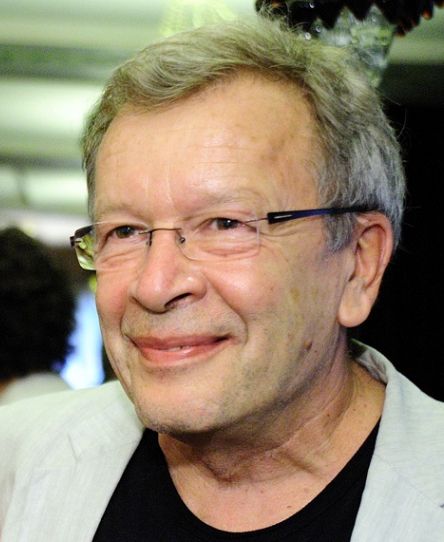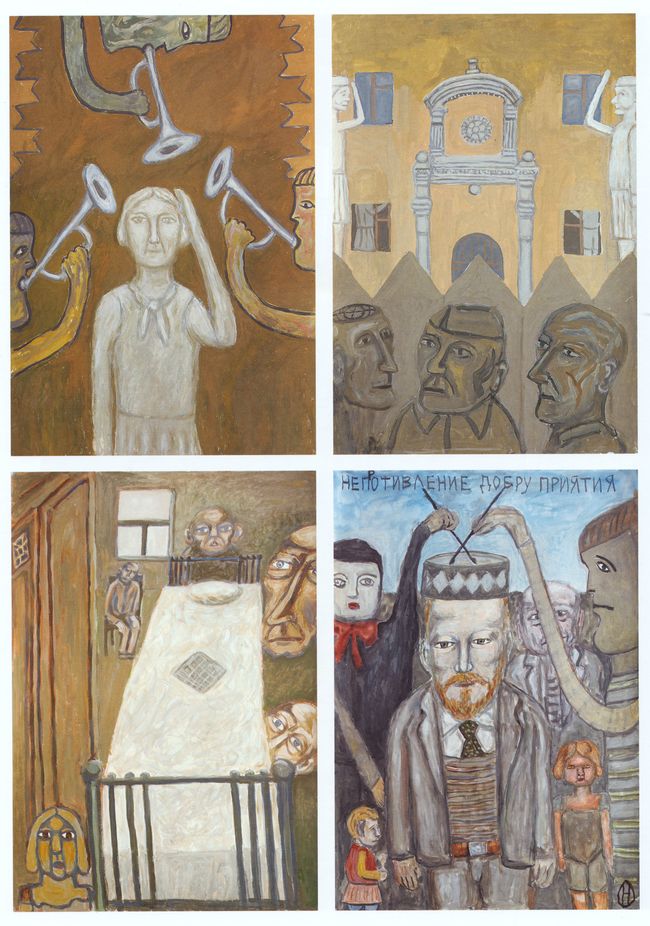How to survive living with an “idiot”?
Viktor YEROFEYEV: “The Russian society is a fiction invented by journalists”
Russian writer Viktor Yerofeyev came to Kyiv to take part in the launch of the art project “Tango in a Madhouse,” created by Ukrainian artists Zoia Orlova and Oleksandr Naiden. The exhibition, which can be visited at the Institute of Contemporary Art Research, has brought together paintings, drawings and installations. It is dedicated to the study of the characters of Yerofeyev’s seminal story Life with an Idiot. According to the organizers, the work has gained new relevance in the context of the events of recent years, including the Russian-Ukrainian conflict.
We talked to Yerofeyev about the need to educate the society and a new conceptual apparatus required to understand the Russian reality.
Your story Life with an Idiot was made into a film, Alfred Schnittke wrote an opera based on it, and now we have an art exhibition. What are your impressions from the latter project?
“I would also add to that list Andrii Zholdak’s excellent play, staged in Romania and then in Ukraine. I think that with that story, I was able to touch upon the important topic of human nature or rather ‘human underground,’ those things that usually do not get talked about. It is an encounter between the conscious and unconscious, an experience involving both pleasure and violence. These are the things that, frankly, are not part of the international culture’s principal repertory. In addition, it is also an encounter with idiocy which raises the question whether it is useful or harmful to human society. The currently prevailing trend may be called an epidemic of stupidity which has spread to all continents. We can observe it in the election campaign in America, where one of the candidates is a true idiot. We are under attack, for this nonsense can capture and destroy us. Idiocy is partly behind the conflict between Russia and Ukraine as well. After all, to prevent Ukraine from running away from Russia, the latter only needed to be attractive rather than aggressive. Therefore, this subject turned out to be prophetic, and not only in 1980, as it is coming up everywhere now. Orlova’s brilliant and highly individualized interpretation of it, manifested in the ‘Tango in a Madhouse’ exhibition, indicates that this subject is artistically attractive as well. Idiocy is a good plot for an artist.”
Talking to an interviewer, you once called the time in which Russia lives now “the era of government-enforced Orthodoxy.” The modern Russian identity includes very disparate elements, like Stalinism, autocracy, and Orthodoxy. How do they all get along?
“Poorly! That is why we have had those disasters, with the ‘ship of Russian values’ sinking twice. It happened for the first time in 1917. I would not say that those values were perfect, but they were understandable and decipherable. You may ask, what did those values include? Suffice it to read War and Peace, where the Rostovs embody those values, and they are mostly positive. But they all have sunk and crashed. Other values replaced them, but they, too, crashed in 1991. We may say that the values which went into oblivion in 1991 were actually harmful, but people were used to them. Now we live in an ocean of broken values, and I think it concerns not only Russia, but also Ukraine and Belarus. And so, everyone grabs their values based on their own life experience, ones they got from books, family, school, and sometimes the state. Thus, everyone has a ‘bag of values,’ where they put them like marbles. And then, it suddenly turns out that one’s marbles’ set is different from that of one’s neighbor, spouse, children and so on. Society is divided. For this reason, conflicts erupt, and end in victories for the forces able to artificially force their values on others.
“Ukraine sees the Western values as a certain ideal, and rightly so. Generally, the European path is the only way forward for the modern civilization. On the other hand, as you can see, these values have begun to ‘crumble’ even in Europe itself. Europe has begun to live by inertia, and it has complicated further the Ukrainians’ situation. Meanwhile, we have ascribed, since the Tatar-Mongolian invasion, to totally opposite values. The Russian values are based on the primacy of the state. The state is more important than the individual. The individual should serve, the values are dominated by the idea of service. When we compare these values, they come into conflict. That conflict has taken an appalling form in the Donbas. A war of values is going on.”
Organizers of your event in Kyiv called you “a fierce opponent of the Kremlin regime.” Do you agree with that assessment?
“I disagree with the Kremlin regime on many issues, but still, I do not see myself as a member of irreconcilable opposition. I am rather a Menshevik than a Bolshevik within the opposition. Also, I do not look like a fierce person.”
However, you do have a clear stance on the Russian-Ukrainian war, do not you?
“From the Russian values’ perspective, we have come to Ukraine to ‘help our brothers,’ and any international relations issues take second place to that. All Western ambassadors were crying when the issue of Kosovo was decided, and they told me that it handed a carte blanche to Vladimir Putin. This is a difficult and complicated issue. Of course, I support the territorial integrity of Ukraine and want your country to go the European way, want you to win this battle with the values of the Russian state. I am not sure that you will succeed, but if you do not win, we are all doomed to suffer from great and prolonged calamities. If Ukraine fails to assert its European orientation, Russia will have no future as well.”

OLEKSANDR NAIDEN’S PICTURES FROM A CYCLE OF ART BRUT BIOGRAPHIC GOUACHES ON STANDARD WHATMAN PAPER SHEETS. ART PROJECT “TANGO IN A MADHOUSE.” ORGANIZED BY ARTHUSS FOUNDATION OF CULTURAL INITIATIVES
You have said that today’s Russia is in dire need of education. Once upon the time, Peter the Great brought Kyivan intellectuals to educate Russia, including, say, Feofan Prokopovych. Who could take this job today?
“We have excellent educators, like my friend Irina Prokhorova [a Russian literary critic, editor-in-chief of Novoe Literaturnoe Obozrenie. – Ed.]. I think we have enough educators of our own, but if, for example, France or Ukraine will have a better sort, we will happily hire them as well. We are in dire need of education because the brainwashing TV has just destroyed the Russian mass consciousness, turned it into a mishmash. But the issue of education will only come to the fore after a regime change, for educators can only survive on the margins under this regime.”
Is the society prepared to be educated?
“The society is absolutely unprepared. I would say that it is ‘anti-prepared.’ Today’s society is built on the principle of state patriotism. I think now is the first time in the history of Russia that the ruler shares the people’s values. It is a unique case! In a recent public opinion survey about the Boeing shootdown, half of the respondents believed that Ukraine had shot it down, the rest blamed Western intelligence agencies, and only one percent stated that it was the Russians who shot down the plane. This is worse than in the Soviet era, as about five percent of the public tried to resist propaganda then, but only one percent do so now.”
That is, education can only come from above, as in Peter the Great’s time?
“Yes, education will only become possible when a ruler who is willing to do it, but is also heavy-handed enough, will come to power and try to turn things around. Perhaps Boris Nemtsov could have become such a politician. I was a close friend of Nemtsov, and he told me that the Grandpa, that is, Boris Yeltsin, had chosen him as his successor. But in the end, another man came to power, who has been a kind of ‘anti-Nemtsov.’”
A new form of propaganda, lately deployed by the Russian regime, involves not just lies, but primarily denial of the very existence of truth. The Russian so-called media’s coverage of the Boeing disaster is one of the most glaring examples. They did not offer a sole interpretation, but a dozen mutually exclusive ones instead. By doing so, are they teaching the society not to believe anybody?
“What is the Russian society? It does not exist; we have just the Russian population. To have a society, you need people to have values in common. The Russian people do not have such values. The very notion of ‘people’ is an archaic concept. Archaic values are present in Russia to some extent. But I strongly object to calling this thing a society. Maybe one can find in Moscow a number of people who can be seen as part of something similar to society. However, I visited lately Northern Siberia, the land of the Evenks. What kind of ‘Russian society’ can be found there? There are few Russians there, and no society. There are reindeer farmers instead. Here, we have to be careful not to fall for this Eurocentrism, which measures everything using criteria which are applicable in France or, at best, Poland. The Russian society is a fiction used by journalists.
“Propaganda requires not the presence of truth, but the presence of government will and interest. You cannot ‘propagate truth,’ as this requires normal speech, not propaganda. Propaganda is an act of violence against reason. The Kremlin knows who shot down the Boeing, and that is why they are attacking the other side. They know that the US intelligence agencies had nothing to do with it. Information is presented so as to create conditions for mobilizing the people, to make it stick to the leaders. The leaders can believe whatever they want, but they are addressing the people with the emotions it needs. If we look at some authoritarian regimes in Latin America or Antonio Salazar’s Portugal, we will see something similar. The biggest mistake made by Western journalists is discussing Russia, China, and Korea in terms of European concepts.”
But where, then, should we look for an adequate conceptual apparatus?
“We should create it! It was not created by the Sovietologists who failed to predict the perestroika. All those Americans, British, and West Germans who were studying the Kremlin were completely taken aback then. Who was able to predict the Crimean crisis? No one was. ‘It is impossible, because it cannot happen,’ they believed. Everything is possible! Russia has a very strong archaic consciousness. I have said that Russia still lives in a fairy tale. You are dismantling this fairy tale at the moment. It is still alive among the Ukrainian people, but the dismantling has started. It may lead Ukraine onto the European development path. Russia, meanwhile, still lives in a fairy tale, one featuring Baba Yaga, Alyonushka, Brother Ivanushka, Gray Wolf, Tsar, and the Three Brothers. The roles do not change, only performers do. Ivan the Terrible was replaced by Nicholas I, then Alexander III, and now Putin. The youngest brother, Ivan the Fool, is the principal character of that fairy tale who believes that one should do nothing, since the magic tablecloth is the solution. Where is Europe in that?”
Newspaper output №:
№63, (2016)Section
Culture





